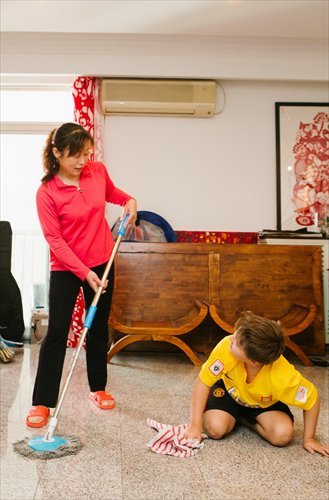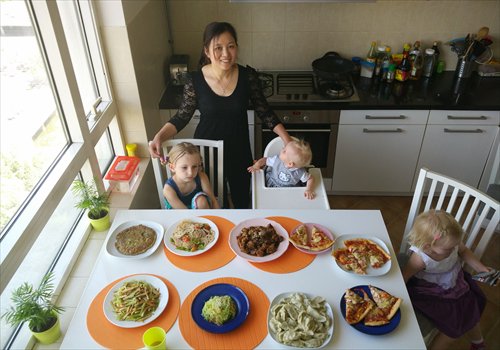Chinese ayi talk about their observations of expat life in Beijing

Meng Junman (left) cleans the house of the expat family she works for, as their younger son Ty plays. Photo: Li Hao/GT
For a lot of expats in China, ayi, or domestic helpers, are an essential part of home life. Ayi not only clean and run errands, many also help take care of children, cook and help their employers keep their lives together as they navigate work, family and the outside world in a new country. Many ayi who work full-time develop deep relationships with the families they serve, witnessing their ups and downs, sharing their joys and sorrows and serving as cultural liaisons between expats and the country they now call home. Two Chinese ayi now share their most memorable stories from the years they've spent working for expat families.
Zhang Pingping, 41 years old, from Anhui Province, who has worked as an ayi for expat families for eight years
In 2008, I started working for my first foreigner family, and I stayed with them for over two years. Before that I worked for Chinese families for eight years.
Normally, to work for an expat family, Chinese ayi must have a reference from a former expat employer, but in my case, a member of the Chinese family I worked for was colleague with a member of the expat family, and they introduced me.
The family came from Finland. I had never met a single foreigner before that, so I was a little nervous about working for them. I was worried whether I could do the job well, and whether I'd have a good relationship with them, because in my eyes, foreigners seem so distant. Even when we're standing right next to each other, it seems like we're living in separate worlds.
But to my surprise, I became really close with every member of that family. They were more caring, humane and respectful to me than my Chinese employers, and even with the language barrier, I became closer with them than with any of my Chinese employers.
Their young son, who was nicknamed Mumu, was really attached to me. I started taking care of him when he was only 6 months old, and watched him grow from a little baby lying in his crib into a boy who could walk and talk in three different languages, Finnish, English and Chinese. He would even read books to me.
Some days, when I called in sick or when I went back to my hometown for the holidays, Mumu would cry and refuse to eat whatever his mother had cooked. It broke my heart when I heard him crying over the phone when his mother called me and asked me what to do. I have a son, who was 8 years old back then, and I have always thought of Mumu as my younger son.
The family really appreciated my role in taking care of the family. I remember when the husband Markus held a birthday dinner at their home, they didn't have enough chairs for the guests. Seeing that I didn't have a chair, Markus offered me his. I said he didn't have to do that, since I was there to serve the party, but he insisted. I felt respected and that my hard work was being acknowledged by the family.
Two years later, the family moved back to Finland because Markus' company relocated him, and the couple told me that they wanted to bring me back with them. They said I could bring my son with me, and they would arrange a good school for him. They told me they could not bear the idea of life without me. I wanted to go with them, but my husband could not find a job in Finland, and I can't speak English or Finnish. I got scared, so I decided not to go with them. I cried when they left. They are like family to me.
It's been six years since they left China, but they still call me once or twice every year, asking how my family is doing, and telling me how they are doing. They are learning to cook Chinese food now.
At the beginning, when they called, little Mumu would run to the phone and shout out "Ayi!" with his sweet voice and talk to me, telling me about how many new friends he had made. But for the last two years, Mumu has stopped coming to the phone. He's seven years old now, a little man. I guess he has forgotten about me, his Chinese ayi.
After they left, they recommended me to their friends, also a Finnish family. I remember when I first started working for that family, the mother, Mirve, asked when my birthday was. The day of my birthday, Mirve surprised me with a bunch of flowers hidden behind her back. I told her it was the first time I had ever received flowers, because my husband is a migrant worker, and cannot afford the luxury of romantic gestures like flowers.
When the family left the country, I made Mirve a cross-stitch of the Chinese character fu, which means "blessing," and my husband made a chair out of red wood. Just a couple of days ago, they sent a photo by WeChat, showing that they had decorated the new house with the embroidery and the chair.

Zhang Pingping cooks lunch for her current employers, a Russian family in Beijing. The three kids are big fans of her cooking. Photo: Courtesy of Zhang Pingping
Meng Junman, 47, from Hebei Province, who has worked as an ayi for expat families for 10 years
I like to work for expat families because the salary is higher, and I get paid leave for holidays. Most importantly, they respect ayi more. They know that it's your job, and people deserve respect no matter what job they do, unlike in some Chinese families where I would sometimes get scolded.
In most people's eyes, expats in China live a rather comfortable and carefree life. They have enough money, and they can satisfy their every whim.
Having lived with expat families, I know that it is not true; they also have their share of difficult moments, perhaps even more than normal Chinese families.
I have worked for my current expat family for more than five years, the longest period I have ever worked for one family, but they have to leave the country at the end of this month, leaving their older daughter in China alone.
It was only a few months ago, before Spring Festival, that I arrived at the house to find the mother of the family, Theresa, who is usually outgoing, crying on the sofa. I was shocked, and asked what happened.
She explained using her broken Chinese and body language that they had to move back to the US. For months, her younger son Ty has been unhappy at school because he was being bullied.
Theresa had been trying to find a new school for him, but found that the tuition at other international schools was around 300,000 yuan ($46,170) a year, which was much more than they could afford.
I was shocked at the whopping price of international schools, and started to understand the pressure normal expat families are under if they don't make a lot of money.
I didn't know what I could do to comfort Theresa, so I hugged her for a long time, and told her it would be OK, though I knew it wouldn't, not even for me. It would be easy for me to find another family, but I would miss my friends.
Since then, the family has been under a cloud of sadness.
Just a few days ago, I saw their older daughter, Monique, crying in her room, because as a senior in high school, she has to stay in China for another year to finish her education, with her family back in the US.
Monique is only 17 years old now, and has to live in China alone for a year. I have a daughter who is 24 years old. When she left for university in another city at the age of 18, she cried every night in the beginning. I can only imagine the pain Monique and her family will go through living an ocean apart.
Things to know about Chinese ayi
1. According to Louis Ma, co-founder of a Beijing-based housekeeping service company, over the past three years, a lot of foreign employees have seen their salaries falling, which means that the supply of ayi currently outweighs the demand. As such, competition for jobs has increased, leading many Chinese ayi to rack up additional qualifications, such as English-language skills. Three years ago, by contrast, almost no Chinese ayi were able to speak English. According to an October 2013 report by People's Daily, in 2010, the Chinese government began rolling back preferential policies for foreign companies in China. According to a caixin.com report later that year, expats no longer enjoy tax exemptions on the dividends they receive at foreign companies.
2. When picking out ayi, customers should first look at their reference letters, and call their previous employer to confirm. Families with children should look for ayi with first aid training certificates.
3. According to Ali Guisen, who works at a foreign car company, Chinese ayi offer a wider range of services, including cleaning, washing and ironing, than domestic helpers in the other countries he's lived in, like Germany and Turkey. In Germany, he said, domestic helpers usually specialize in a single service.
Newspaper headline: Unexpected bonds